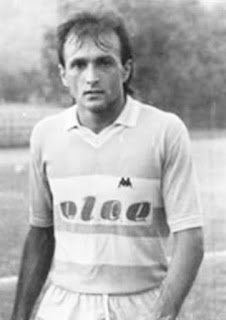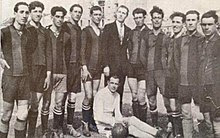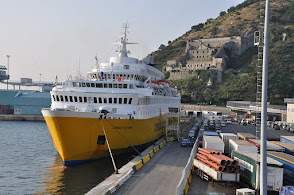Prolific striker who helped Italy reach 1970 World Cup final
The footballer Roberto Boninsegna, a prolific striker who scored 171 goals in 14 years in Italy’s Serie A, was born on this day in 1943 in Mantua in Lombardy.
Roberto Boninsegna in the colours of Inter Milan,
the club he dreamed of playing for as a child
Boninsegna, whose relentlessly tenacious attacking style made him a fan favourite despite his relatively small physical stature, was at his peak during a seven-season spell with Inter Milan from 1969 to 1976, during which he scored 113 goals in 197 Serie A appearances.
He was also a prominent member of the Italy national team at the 1970 World Cup finals in Mexico, scoring the opening goal for the azzurri in their epic 4-3 extra-time victory over West Germany in the semi-final.
Boninsegna was also responsible for Italy’s first-half equaliser against Pele's Brazil in the final, before the South Americans, universally acclaimed as one of the finest teams in international football history, overwhelmed them in the second half, winning 4-1.
His aerial prowess, which saw him regularly outjump taller defenders to ensure his head was first to the ball, earned him the nickname Bonimba from the celebrated football writer Gianni Brera. It stuck with fans, even though the player himself did not care for it because it drew on an obsolete word used to describe circus dwarfs.
Boninsegna is said to have entered the world during adversity, his mother, Elsa, giving birth during an Allied bombing raid on Mantua during World War Two.
Always an Inter Milan fan - he wore the blue and black nerazzurri shirt under his club colours while playing youth football for his local team - Boninsegna suffered the heartbreak of rejection when he joined Inter’s youth programme only to be discarded at an early stage in his development.
The Tuscan club Prato eventually gave him his start in the professional game in 1963. His next move took many miles from home to Basilicata, spending a season with Potenza before returning north to join Varese, where he made his Serie A debut in 1965.
 |
| Boninsegna's reputation soared after he teamed up with Luigi Riva at Cagliari |
Boninsegna missed out on Cagliari’s great triumph of the following campaign, when they lifted the scudetto for the only time in the club’s history, having achieved the dream previously dashed when Inter signed him in 1969 for a fee of 600 million lire, equivalent roughly to €13.7 million today and a colossal sum in terms of football transfers at the time.
With Inter, Boninsegna enjoyed considerable success, helping the nerazzurri win the scudetto in 1970-71, a season in which he was Serie A’s capocannoniere - top scorer - with 24 goals. In total, across his time at San Siro, he made 281 appearances (197 in Serie A , 55 in the Coppa Italia and 29 in Europe) and delivered 171 goals (113 in Serie A, 36 in the Coppa Italia and 22 in Europe).
Yet his spell with Inter also included controversy after his part in what would be dubbed La partita della lattina - the Match of the Can. This was the first leg of the European Cup round-of-16 match between Inter Milan and Borussia Mönchengladbach in Germany.
In the 29th minute, with Inter trailing 2–1, Boninsegna was about to take a throw-in when he collapsed to the ground after appearing to be hit on the head by a Coca-Cola can thrown from the stands.
Boninsegna was stretchered off. Inter officials demanded the match be abandoned but the Dutch referee, Jef Dorpmans, allowed play to continue. However, the Inter team effectively refused to compete, and Mönchengladbach went on to thrash them 7–1, a result that shocked European football.
 |
| Boningsegna helped Italy reach the final of the 1970 World Cup in Mexico |
There was also confusion over whether the can that hit Boninsegna was full, as the Italian team’s officials said, or empty, which some on the German side believed. With no TV cameras capturing the incident on film, it was not possible to review what had happened.
Inter’s vice-president, lawyer Giuseppe Prisco, failed in his argument that the match should be awarded to Inter, UEFA deciding instead that it be replayed. However, in another controversial twist, the European governing body allowed the scheduled second leg in Milan to go ahead before the first leg was replayed. Inter won it 4-2.
When the sides met again on neutral ground at the Olympic Stadium in Berlin, Inter simply had to protect their lead to progress to the quarter-finals and the contest ended goalless. Inter went on to reach the final but were beaten 2-0 by Ajax, for whom Johann Cruyff scored both goals.
Boninsegna’s Inter career ended with a transfer to Juventus in 1976 in a deal that saw Juventus striker Pietro Anastasi switch to San Siro. Inter judged that, at nearly 34, Boninsegna had his best years behind him, yet he went on to enjoy a renaissance in Turin, helping his new club win Serie A twice, a Coppa Italia and the UEFA Cup - the famous club’s first European trophy - before ending his professional career with Verona.
For the Italian national team, he won 22 caps between 1967 and 1974, scoring nine goals.
After retiring as a player in 1981, Boninsegna had a number of coaching roles, including at his home town club, Mantua, where he also served as technical director and vice-president. However, his post-playing career never reached the heights he touched as a player.
Nonetheless, his legacy as a player remains intact. He is remembered not only for his goals but for his resilience, having risen from wartime hardship to become a symbol of Italian footballing excellence.
Boninsegna, now 82, still lives in Mantua. Even decades after his retirement, his name evokes memories of powerful strikes, dramatic goals, and unwavering determination.
Travel tip:
Mantua's Palazzo Ducale, the seat of the city's
powerful Gonzaga family for almost 400 years
Mantua, where Roberto Boninsegna was born and still lives, is an atmospheric and historic city in Lombardy, just over 130km (81 miles) southeast of Milan. In the Renaissance heart of the city is Piazza Mantegna, where the 15th century Basilica of Sant’Andrea houses the tomb of the artist, Andrea Mantegna, arguably the city’s most famous son, although the Roman poet Virgil was born in what is now Pietole, just a few kilometres outside the city. The basilica was originally built to accommodate the large number of pilgrims who came to Mantua to see a precious relic, an ampoule containing what were believed to be drops of Christ’s blood mixed with earth. This was claimed to have been collected at the site of his crucifixion by a Roman soldier. Mantua was also the seat between 1328 and 1707 of the powerful Gonzaga family, who significantly expanded the city’s Palazzo Ducale, transforming it into their official residence and one of the largest palatial complexes in Europe. The palace’s Camera degli Sposi is decorated with frescoes by Andrea Mantegna, depicting the life of Eleonora’s ancestor, Ludovico Gonzaga, and his family in the 15th century. The beautiful backgrounds of imaginary cities and ruins reflect Mantegna’s love of classical architecture.
Hotels in Mantua by Hotels.com
Travel tip:
Milan's famous Stadio Giuseppe Meazza in the
San Siro district is earmarked for demolition
During his Inter Milan career, Roberto Boninsegna became one of the many legendary players to have graced the colossal Stadio Giuseppe Meazza, in the San Siro district of northwest Milan. The stadium, which can accommodate almost 80,000 spectators, was completed in its original form in 1926. A number of extensive renovations, the last of which was completed ahead of the 1990 World Cup finals, gave the stadium its distinctive appearance, with its top tier supported by 11 cylindrical towers which incorporate spiral walkways. Giuseppe Meazza, from whom the stadium takes its name, spent 14 years as a player and three terms as manager at Inter. Since 1947, Inter and their city rivals AC Milan have shared the stadium but its days are numbered in its present iconic form. The two Milan clubs have jointly purchased the stadium and surrounding land from the Municipality of Milan for €197 million, ending nearly 80 years of public ownership. The clubs plan to demolish most of the existing stadium to make way for a new, state-of-the-art arena with a capacity of 71,500 seats. It is planned that the new venue will be ready in time for the 2032 European Championships finals, which Italy will host jointly with Turkey.
Find accommodation in Milan with Expedia
More reading:
Giuseppe Meazza, the Inter striker who gave his name to the San Siro stadium
Luigi Riva, Italy's record goalscorer and hero of Cagliari
Sandro Mazzola, the Inter great whose father perished in the Superga disaster
Also on this day:
1868: The death of composer Gioachino Rossini
1907: The birth of Princess Giovanna of Italy - Tsaritsa of Bulgaria
1914: The birth of film director Alberto Lattuada
1936: The birth of novelist and short story writer Dacia Maraini












_-_El_Gr%C3%A1fico_874.jpg)
.jpg)








.jpg)



.png)
.jpg)
.jpg)

_13.jpg)